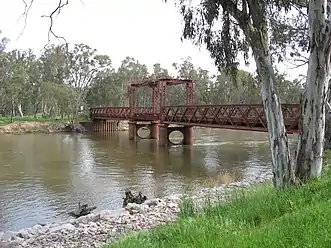Murray River road and railway bridge, Tocumwal
The Murray River road and railway bridge is a heritage-listed railway and former road bridge that carries the Tocumwal railway line across the Murray River at Tocumwal, New South Wales, Australia. It is also known as the Tocumwal Road and Rail Bridge over Murray River. The property is owned by the Transport Asset Holding Entity.
Murray River road and railway bridge, Tocumwal | |
|---|---|
 The Tocumwal Bridge, viewed from Tocumwal, New South Wales | |
| Coordinates | 35°48′48″S 145°33′24″E |
| Carries |
|
| Crosses | Murray River |
| Locale | Tocumwal, New South Wales, Australia |
| Begins | Tocumwal, New South Wales |
| Ends | north of Boomagong, Victoria |
| Other name(s) | Tocumwal road and rail bridge over Murray River |
| Owner | Transport Asset Holding Entity |
| Preceded by | Edward Hillson Bridge, Tocumwal (Goulburn Valley Highway |
| Followed by | Barmah Bridge, Barmah |
| Characteristics | |
| Design | Truss lift span |
| Material | Cast iron |
| No. of spans | 3 |
| Piers in water | 2 |
| Rail characteristics | |
| Track gauge | 4 ft 8+1⁄2 in (1,435 mm) standard gauge |
| History | |
| Constructed by | NSW Public Works Department |
| Opened | 1895 |
| Inaugurated | Easter 1895 by James Young, NSW Secretary for Public Works and Sir Maurice O'Rorke |
| Official name | Tocumwal road and rail bridge over Murray River |
| Type | State heritage (built) |
| Designated | 2 April 1999 |
| Reference no. | 1061 |
| Type | Railway Bridge / Viaduct |
| Category | Transport – Rail |
| Builders | NSW Public Works Department |
| Location | |
History
The Truss lift span bridge over the Murray River opened in 1895, and was constructed by the NSW Public Works Department. It has three spans, the centre span having an opening lift-span for navigation. Initially provided for road traffic only, it was strengthened for rail traffic in 1908, and was used for both road and rail traffic until November 1987. The Edward Hillson Bridge opened on 9 November 1987,[1] located a short distance upstream, the concrete road bridge carries the Goulburn Valley Highway across the Murray, with the old bridge used for rail traffic only since 1987.[2][3]
When opened, monthly lifting of the centre span was carried out for testing purposes. When the bridge was made a rail and road bridge, the span was always kept down unless enquired by river traffic. By 1930, river traffic declined, and so by 1944, the monthly lifting was altered to yearly. In 1951, it was proposed to keep the span closed, the last lift for river traffic being in 1933, and no maintenance lifting having been carried out for a decade. In September 1977, both state governments agreed to keep it fixed, and removed requirement for being able to lift it. Easter 1995 celebrations including operation of the lift span.[2]
Heritage listing
The river bridge was a combined road and rail structure. It is of very high significance because of its technological value and its importance in the history of transport in the State and inter-state rivalries.[4]
Tocumwal road and rail bridge over the Murray River was listed on the New South Wales State Heritage Register on 2 April 1999.[4]
See also
- List of railway bridges in New South Wales
- List of bridges in Australia
- List of crossings of the Murray River
References
- "History of Tocumwal, New South Wales on the Murray River". Discover Murray River. 2020. Retrieved 7 April 2020.
- Whitehead, Bob (2008). Tocumwal Railway Centenary.
- "Tocumwal Bridge over Murray River". Roads & Traffic Authority. Retrieved 4 January 2009.
- "Tocumwal road and rail bridge over Murray River". New South Wales State Heritage Register. Department of Planning & Environment. H01061. Retrieved 2 June 2018.
 Text is licensed by State of New South Wales (Department of Planning and Environment) under CC-BY 4.0 licence.
Text is licensed by State of New South Wales (Department of Planning and Environment) under CC-BY 4.0 licence.
Attribution
![]() This Wikipedia article was originally based on Tocumwal road and rail bridge over Murray River, entry number 01061 in the New South Wales State Heritage Register published by the State of New South Wales (Department of Planning and Environment) 2018 under CC-BY 4.0 licence, accessed on 2 June 2018.
This Wikipedia article was originally based on Tocumwal road and rail bridge over Murray River, entry number 01061 in the New South Wales State Heritage Register published by the State of New South Wales (Department of Planning and Environment) 2018 under CC-BY 4.0 licence, accessed on 2 June 2018.
External links
![]() Media related to Tocumwal Rail Bridge at Wikimedia Commons
Media related to Tocumwal Rail Bridge at Wikimedia Commons
- Murray River - Tocumwal Railway Bridge (Streaming video) (YouTube). Slingard Studios. 23 October 2016.
